Key part of Toronto's vaccine strategy could be scrapped after Canada Day
 COVID-19 vaccine recipients are photographed at the Downsview Arena vaccination site, in Toronto, Friday, April 16, 2021. THE CANADIAN PRESS/Tijana Martin
COVID-19 vaccine recipients are photographed at the Downsview Arena vaccination site, in Toronto, Friday, April 16, 2021. THE CANADIAN PRESS/Tijana Martin
A key part of Toronto’s hyper-local vaccine rollout strategy could be scrapped as soon as Canada Day, without additional funding from the provincial government to help pay for it.
The city has used vaccine engagement teams made up of hundreds of community ambassadors to help address hesitancy in neighbourhoods where uptake was below the city-wide average, in some cases even going door-to-door in apartment buildings to speak face-to-face with residents.
But during a meeting of the city’s board of health on Monday, Deputy Medical Officer of Health Dr. Na-Koshie Lamptey revealed that the funding to operate the program is set to run out on July 1.
Lamptey said that Toronto Public Health wants to keep the program running through the end of 2022 but will need additional money from the next provincial government to do that.
“We expect an increase in COVID-19 activity in the fall with potential waning immunity and increased activity indoors, especially for people over the age of 50. We also anticipate new priorities for outreach, including when the licensed product becomes available for children under the age of five,” she said. “So it is recommended that the engagement teams continue to operate until December 31 with financial support from the province. Without an extension the City of Toronto would have significantly reduced capacity to mitigate the disproportionate impacts of COVID-19 and that could have effects on health inequities.”
Data released by Toronto Public Health on Monday showed that the first dose coverage rate in the 35 priority neighbourhoods that vaccine engagement teams were deployed has risen from 66 to 85 per cent since June, 2021.
That outpaced the growth in first dose coverage in all pother neighbourhoods, which went from 72 per cent to 85 per cent during the same time period.
Lamptey said that polling done by the city has also underscored the success of the program.
“It showed that 77 per cent of ambassadors reported an increase in vaccine confidence following their engagements with community members and 72 per cent reported that the transportation resources they provided to community members, such as ride sharing vouchers and transit fares, were key to improving access to vaccine appointments,” she said. “About 93 per cent of residents that were surveyed also reported that the materials that they were given to them by the ambassadors helped increase their confidence.”
There are currently about 600 community ambassadors assigned to vaccine engagement teams. The city says that those ambassadors spent approximately 70,000 total hours engaging with Torontonians over a one-year period ending in March. They interacted with those residents in 43 different languages, according to the city.
CTVNews.ca Top Stories

'A beautiful soul': Funeral held for baby boy killed in wrong-way crash on Highway 401
A funeral was held on Wednesday for a three-month-old boy who died after being involved in a wrong-way crash on Highway 401 in Whitby last week.
Police handcuff man trying to enter Drake's Toronto mansion
Toronto police say a man was taken into custody outside Drake's Bridle Path mansion Wednesday afternoon after he tried to gain access to the residence.
Biden says he will stop sending bombs and artillery shells to Israel if they launch major invasion of Rafah
U.S. President Joe Biden said for the first time Wednesday he would halt shipments of American weapons to Israel, which he acknowledged have been used to kill civilians in Gaza, if Prime Minister Benjamin Netanyahu orders a major invasion of the city of Rafah.
U.S. presidential candidate RFK Jr. had a brain worm, has recovered, campaign says
Independent U.S. presidential candidate Robert F. Kennedy Jr. had a parasite in his brain more than a decade ago, but has fully recovered, his campaign said, after the New York Times reported about the ailment.
What is whooping cough and should Canadians be concerned as Europe declares outbreak?
There is currently a whooping cough epidemic in Europe, with 10 times as many cases compared to the previous two years. While an outbreak has not been declared nationwide in Canada, whooping cough is regularly detected in the country.
Pfizer agrees to settle more than 10K lawsuits over Zantac cancer risk: Bloomberg News
Pfizer has agreed to settle more than 10,000 lawsuits about cancer risks related to the now discontinued heartburn drug Zantac, Bloomberg News reported on Wednesday, citing people familiar with the deal.
Quebec premier defends new museum on Quebecois nation after Indigenous criticism
Quebec Premier Francois Legault is defending his comments about a new history museum after he was accused by a prominent First Nations group of trying to erase their history.
B.C. theatre to pay $55K to neurodivergent actor in discrimination case
British Columbia's human rights tribunal has awarded a neurodigergent actor, who was diagnosed with sensory and learning disorders, more than $55,000 after finding that a Kelowna theatre company discriminated against him because of his disabilities.
Who's responsible for regulating cannabis stores operating under the sovereignty banner?
It's not quite clear who is supposed to be regulating so-called sovereign cannabis stores or even ensure they're benefiting Indigenous communities.
































